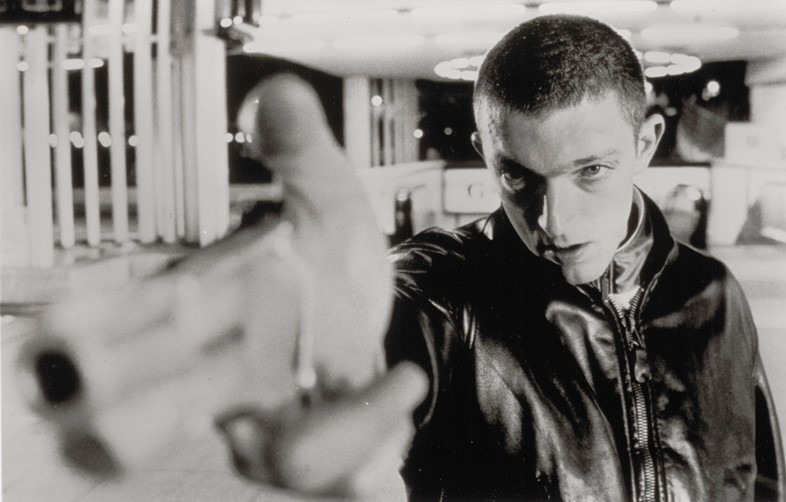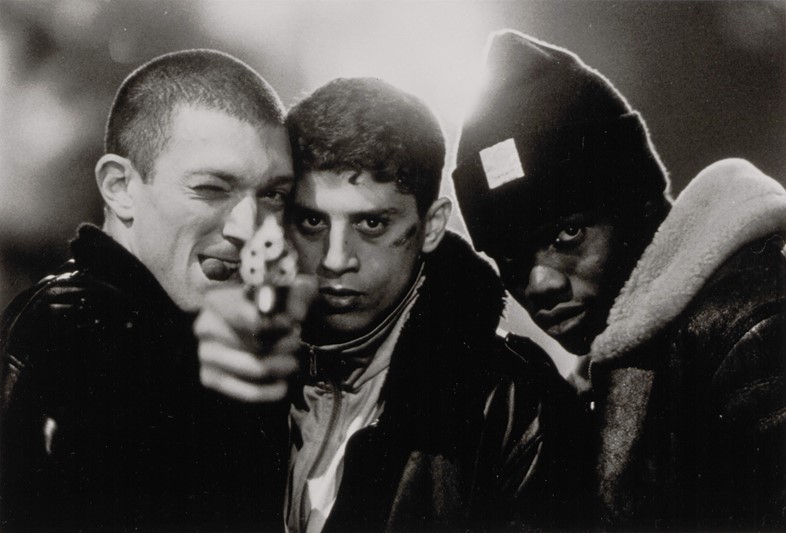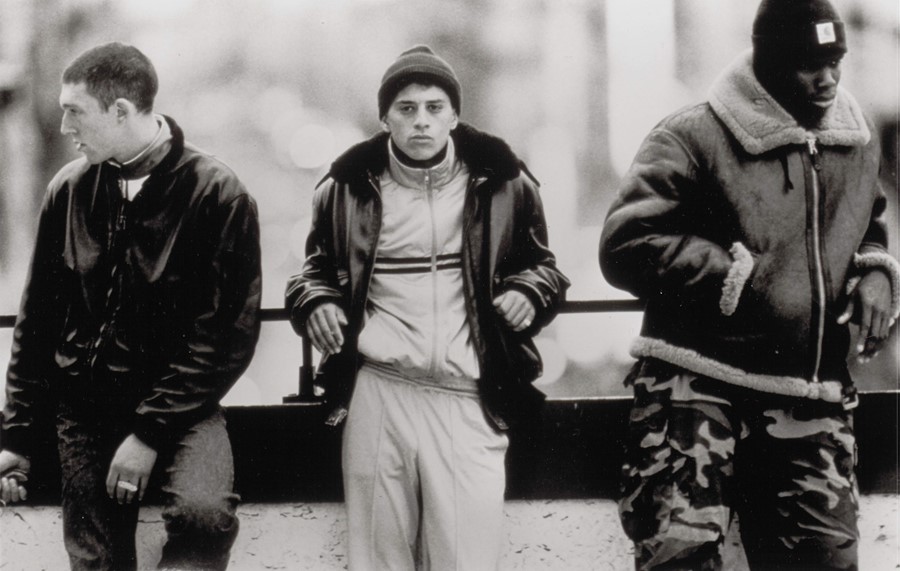To mark La Haine’s 25th anniversary, three people share their memories of making the film, including director Mathieu Kassovitz and Hubert Koundé, who played Hubert
This month, La Haine celebrates its 25th anniversary. As you may know, the breakthrough movie, directed by Mathieu Kassovitz, follows the story of a young Arab boy called Abdel living in a banlieue of Paris. When Abdel is arrested and beaten unconscious by the police, his friends Hubert (Hubert Koundé), Vinz (Vincent Cassel) and Saïd (Saïd Taghmaoui) try to come to grips with what has happened, and riot ensues. Unfortunately, as the events of the last fortnight show, the film’s themes are as relevant as ever. Skilfully balancing bleak realism with humour, La Haine is as timeless as it is politically charged and, in addition to winning several awards, was even screened for the French cabinet at the request of then President, Jacques Chirac. To honour the film and its enduring influence, La Haine will be re-released in cinemas by the BFI in a new 4K restoration later this year, followed by a Blu-ray release. Screenings in Paris and Cannes are also in the works, while the original script will be released by French publishing house Maison CF, featuring never seen before behind-the-scenes photographs and notes from the shoot. Here, to mark the anniversary, Kassovitz and members of the cast and crew share their memories of making the film.
Mathieu Kassovitz, Director
Mathieu Kassovitz is a French director, actor, screenwriter and producer. He won the award for Best Director at Cannes and Best Film at the César Awards for La Haine, when he was just 27. Headstrong and outspoken, he’s criticised the French film scene and government for ignoring the obvious, which lead to a heated letter exchange with then President Nicolas Sarkozy.
“When you want to make a political movie you want it to be relevant. No point in pleasing people. There are already many movies that can please people. Monty Python or Disney movies are passed on from generation to generation but to be able to do a political movie that stays relevant 25 years later is amazing and terrible at the same time. Because it also means that the problems are still here. They are even worse now, they are combined with other problems that we didn’t have 25 years ago.
“That movie changed a lot of people’s lives. I met people who became policemen or lawyers because of the film. That’s why we are releasing it again, because it’s a movie people can relate to. It’s what you’re looking for when you make a political film. People are more than just entertained.
“My memories stem more from the audience than from the movie itself. The way it was received and the way people see it today. Either they were from the projects and it changed their way of looking at a problem. Art can really help with that. On a political level, it gave the kids from the suburbs a certain strength. It also gave cops another angle at looking at those kids. Many people were inspired to produce new work.
“Even this year’s César winner is inspired by La Haine, not by the movie itself but by the theme. The end is almost the same. JR was 13 years old when he watched the film and his artwork is very much inspired by the poster. The film actually helped to create a new generation of filmmakers and artists. It wasn’t just a trend. It’s an adventure that we shared together. So that’s the point of making movies like that and I’m proud of it.
“There is no music in La Haine but it’s a hip-hop movie. As it’s political, hip-hop and street culture has to be a part of it. Hip-hop is educating and entertaining at the same time. It’s the best way to learn, we call it ‘edutainment’. After all, La Haine is also a comedy, except for the last 20 seconds of course.”

Hubert Koundé, Hubert
Hubert Koundé is a French-Benin actor and director. As the introverted boxer, he plays the moral part of the trio, trying to reason when emotions rise too high.
“I don’t remember the exact day when Mathieu proposed this project to me, but I do remember that I immediately felt that he wanted us to be involved with our entire being in this project. The use of our real names became the foundation of the movie and a way for the audience to grasp the strength of our purpose. The viewer had to have no doubts about us belonging to the suburbs. Even today, some spectators find it difficult to see these three characters as actors. Before we started shooting I didn’t even know Saïd or Vincent. We didn’t think about our careers, we spent our evenings to discuss cinema, to discuss authors and films which would inspire us.
“I was 24 when the film was made and felt a revolt against the system just like Vincent and Saïd. Even if we did not come from the same backgrounds, we shared a common vision of society.
“While Saïd and I came from the suburbs and distant universes of the seventh art, Vincent and Mathieu were kids of the Parisian bourgeoisie, already active in the world of cinema. It’s these differences that give power to La Haine. Saïd and I were bringing truth to the film while Mathieu and Vinz gave it a certain aesthetic and shared their knowledge with us. I often observed them to learn how they approach their work in order to find my own style. But that’s not to say that our different backgrounds clashed, it’s quite the opposite: We don’t need to be poor to have a sincere look at poverty.
“At that time, we had hatred and we wanted to use the cinema to scream out our anger: tired of ongoing injustice, fed up with police blunders and controls for no reason, fed up with the glass ceiling, fed up with passing summer going around in circles in our neighbourhood ... Yesterday, we were young people with hatred. Today young people have become Les Misérables, another film who is likely to become a cult in 25 years.
“Films like La Haine are rare in cinema. It is still rare to see three friends with different skin colours and different cultures. The four of us represented a new possibility mixed with hope and it’s this energy that carries the film forward.”

Pierre Aïm, Director of Photography
Pierre Aïm was the DOP for La Haine, which marked the start of a long career. Since its release in 1995, he has worked on films such as Paris, I Love You, In July, Welcome to the Sticks and The Nile Hilton Incident.
“We were just at the beginning of our careers and no one knew us. So we didn’t have a lot of money to spare to recreate our surroundings. The film is quite stylised in terms of the angles and how it was shot. Of course, I contribute with my taste and technical know-how but the main characteristics of the film are Mathieu’s idea. Let’s be frank, the best directors are those who know exactly what they want on all levels.
“Mathieu wanted the film to be in black and white. He said it right from the beginning. If you name a film Hate, black and white is much more impactful. It also creates more depth, giving it a documentary feel. Because there weren’t many black and white films made at the time, it added visually more originality and strength. I’ve experimented one year before the shoot with colour film, which I then printed onto black and white film. It became a vital part of the brand.
“We filmed for five weeks in a rough suburb outside of Paris, so it was important to get acquainted with the people who lived there. It’s always hard to be accepted, especially if you walk in with a film crew. So Mathieu had the idea to move into an apartment there with his first assistant, all three actors and the stage manager for two months before the shoot. It was important to him to meet the locals and talk to them. We were very well accepted, they were always around us and everyone was so welcoming and supportive. When we asked them to be quiet during the shoot, they really were quiet. There were no tensions between anyone, we were all just young and excited. It was one of the best shoots I’ve ever done.
“La Haine was the third picture I made, and it was the second one with Mathieu. It was fundamental for me. The career that I have now is thanks to this film. It was groundbreaking and pretty much everyone from the shoot is still active in the world of film to this day. We were all just at the start of our careers. It was an important film for cinema but also for the entire crew.”
La Haine will be re-released in cinemas by the BFI in a new 4K restoration later this year, followed by a Blu-ray release.
